Technology
-
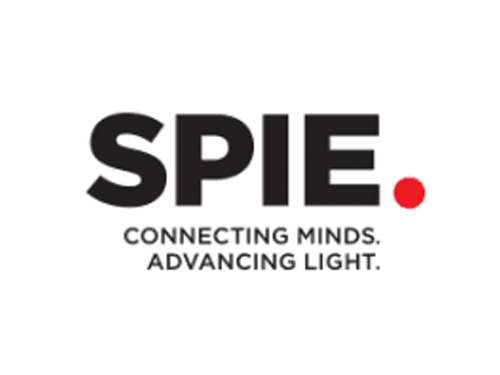 SPIE (The International Society for Optics and Photonics): Scattering Super-lens
The International Society for Optics and Photonics (SPIE), dedicated to advancing an interdisciplinary approach to the science and application of light, published online a short paper authored by a KAIST research team, Dr. Jung-Hoon Park and Professor YongKeun Park of Physics, introducing a new optical technology to observe sub-wavelength light by exploiting multiple light scattering in complex media.
For the article, please go to the link below:
SPIE: Nanotechnology
May 7th, 2014
"Scattering superlens" by Jung-Hoon Park and YongKeun Park
http://spie.org/x108298.xml
2014.05.14 View 7701
SPIE (The International Society for Optics and Photonics): Scattering Super-lens
The International Society for Optics and Photonics (SPIE), dedicated to advancing an interdisciplinary approach to the science and application of light, published online a short paper authored by a KAIST research team, Dr. Jung-Hoon Park and Professor YongKeun Park of Physics, introducing a new optical technology to observe sub-wavelength light by exploiting multiple light scattering in complex media.
For the article, please go to the link below:
SPIE: Nanotechnology
May 7th, 2014
"Scattering superlens" by Jung-Hoon Park and YongKeun Park
http://spie.org/x108298.xml
2014.05.14 View 7701 -
 An Electron Cloud Distribution Observed by the Scanning Seebeck Microscope
All matters are made of small particles, namely atoms. An atom is composed of a heavy nucleus and cloud-like, extremely light electrons.
Korean researchers developed an electron microscopy technique that enables the accurate observation of an electron cloud distribution at room-temperature. The achievement is comparable to the invention of the quantum tunneling microscopy technique developed 33 years ago.
Professor Yong-Hyun Kim of the Graduate School of Nanoscience and Technology at KAIST and Dr. Ho-Gi Yeo of the Korea Research Institute of Standards and Science (KRISS) developed the Scanning Seebeck Microscope (SSM). The SSM renders clear images of atoms, as well as an electron cloud distribution. This was achieved by creating a voltage difference via a temperature gradient.
The development was introduced in the online edition of Physical Review Letters (April 2014), a prestigious journal published by the American Institute of Physics.
The SSM is expected to be economically competitive as it gives high resolution images at an atomic scale even for graphene and semiconductors, both at room temperature. In addition, if the SSM is applied to thermoelectric material research, it will contribute to the development of high-efficiency thermoelectric materials.
Through numerous hypotheses and experiments, scientists now believe that there exists an electron cloud surrounding a nucleus. IBM's Scanning Tunneling Microscope (STM) was the first to observe the electron cloud and has remained as the only technique to this day. The developers of IBM microscope, Dr. Gerd Binnig and Dr. Heinrich Rohrer, were awarded the 1986 Nobel Prize in Physics.
There still remains a downside to the STM technique, however: it required high precision and extreme low temperature and vibration. The application of voltage also affects the electron cloud, resulting in a distorted image.
The KAIST research team adopted a different approach by using the Seebeck effect which refers to the voltage generation due to a temperature gradient between two materials.
The team placed an observation sample (graphene) at room temperature (37~57℃) and detected its voltage generation. This technique made it possible to observe an electron cloud at room temperature.
Furthermore, the research team investigated the theoretical quantum mechanics behind the electron cloud using the observation gained through the Seebeck effect and also obtained by simulation capability to analyze the experimental results.
The research was a joint research project between KAIST Professor Yong-Hyun Kim and KRISS researcher Dr. Ho-Gi Yeo. Eui-Seop Lee, a Ph.D. candidate of KAIST, and KRISS researcher Dr. Sang-Hui Cho also participated. The Ministry of Science, ICT, and Future Planning, the Global Frontier Initiative, and the Disruptive Convergent Technology Development Initiative funded the project in Korea.
Picture 1: Schematic Diagram of the Scanning Seebeck Microscope (SSM)
Picture 2: Electron cloud distribution observed by SSM at room temperature
Picture 3: Professor Yong-Hyun Kim
2014.04.04 View 15265
An Electron Cloud Distribution Observed by the Scanning Seebeck Microscope
All matters are made of small particles, namely atoms. An atom is composed of a heavy nucleus and cloud-like, extremely light electrons.
Korean researchers developed an electron microscopy technique that enables the accurate observation of an electron cloud distribution at room-temperature. The achievement is comparable to the invention of the quantum tunneling microscopy technique developed 33 years ago.
Professor Yong-Hyun Kim of the Graduate School of Nanoscience and Technology at KAIST and Dr. Ho-Gi Yeo of the Korea Research Institute of Standards and Science (KRISS) developed the Scanning Seebeck Microscope (SSM). The SSM renders clear images of atoms, as well as an electron cloud distribution. This was achieved by creating a voltage difference via a temperature gradient.
The development was introduced in the online edition of Physical Review Letters (April 2014), a prestigious journal published by the American Institute of Physics.
The SSM is expected to be economically competitive as it gives high resolution images at an atomic scale even for graphene and semiconductors, both at room temperature. In addition, if the SSM is applied to thermoelectric material research, it will contribute to the development of high-efficiency thermoelectric materials.
Through numerous hypotheses and experiments, scientists now believe that there exists an electron cloud surrounding a nucleus. IBM's Scanning Tunneling Microscope (STM) was the first to observe the electron cloud and has remained as the only technique to this day. The developers of IBM microscope, Dr. Gerd Binnig and Dr. Heinrich Rohrer, were awarded the 1986 Nobel Prize in Physics.
There still remains a downside to the STM technique, however: it required high precision and extreme low temperature and vibration. The application of voltage also affects the electron cloud, resulting in a distorted image.
The KAIST research team adopted a different approach by using the Seebeck effect which refers to the voltage generation due to a temperature gradient between two materials.
The team placed an observation sample (graphene) at room temperature (37~57℃) and detected its voltage generation. This technique made it possible to observe an electron cloud at room temperature.
Furthermore, the research team investigated the theoretical quantum mechanics behind the electron cloud using the observation gained through the Seebeck effect and also obtained by simulation capability to analyze the experimental results.
The research was a joint research project between KAIST Professor Yong-Hyun Kim and KRISS researcher Dr. Ho-Gi Yeo. Eui-Seop Lee, a Ph.D. candidate of KAIST, and KRISS researcher Dr. Sang-Hui Cho also participated. The Ministry of Science, ICT, and Future Planning, the Global Frontier Initiative, and the Disruptive Convergent Technology Development Initiative funded the project in Korea.
Picture 1: Schematic Diagram of the Scanning Seebeck Microscope (SSM)
Picture 2: Electron cloud distribution observed by SSM at room temperature
Picture 3: Professor Yong-Hyun Kim
2014.04.04 View 15265 -
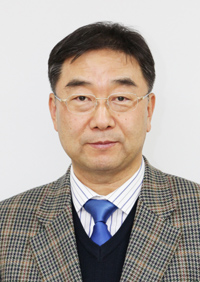 Professor Kyung-Wook Paik Receives the Best Presentation Award from 2014 Pan Pacific Symposium
The Surface Mount Technology Association (SMTA) hosted its 19th Annual Pan Pacific Microelectronics Symposium on February 11-13, 2014 in Hawaii.
The 2014 conference, promoting international technical exchange and extensive networking among microelectronics professionals from around the world, presented over 50 papers from 17 countries.
Professor Kyung-Wook Paik of Materials Science Engineering at KAIST received the Best Presentation Award for his paper titled, “Novel Nanofiber Anisotropic Films for Nine Pitch Assembly” at the conference.
SMTA is an international network of professionals in electronics assembly technologies, including Microsystems, emerging technologies, and related business operations.
2014.03.17 View 9932
Professor Kyung-Wook Paik Receives the Best Presentation Award from 2014 Pan Pacific Symposium
The Surface Mount Technology Association (SMTA) hosted its 19th Annual Pan Pacific Microelectronics Symposium on February 11-13, 2014 in Hawaii.
The 2014 conference, promoting international technical exchange and extensive networking among microelectronics professionals from around the world, presented over 50 papers from 17 countries.
Professor Kyung-Wook Paik of Materials Science Engineering at KAIST received the Best Presentation Award for his paper titled, “Novel Nanofiber Anisotropic Films for Nine Pitch Assembly” at the conference.
SMTA is an international network of professionals in electronics assembly technologies, including Microsystems, emerging technologies, and related business operations.
2014.03.17 View 9932 -
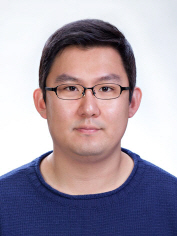 Tae-Wan Kim, a doctoral candidate, receives the best paper award from ECTC
The 2014 Electronic Components and Technology Conference (ECTC) will take place on May 27-30 in Florida, USA. Tae-Wan Kim, a Ph.D. candidate at the Department of Materials Science Engineering (MSE), KAIST, will receive the Intel Best Student Paper Award at the conference.ECTC is the premier international conference that brings together the best researchers and engineers in packaging, components and microelectronic systems science, technology and education in an environment of cooperation and technical exchange. The conference is sponsored by the Components, Packaging and Manufacturing Technology (CPMT) Society of IEEE (Institute of Electrical and Electronics Engineering).The paper describes research on novel nanofiber anisotropic conductive films for ultra fine pitch electronic package application, which was written under the guidance of Professor Kyung-Wook Paik of the MSE Department. In the past ten years, two of his students have received the best paper award from ECTC.
2014.03.14 View 12152
Tae-Wan Kim, a doctoral candidate, receives the best paper award from ECTC
The 2014 Electronic Components and Technology Conference (ECTC) will take place on May 27-30 in Florida, USA. Tae-Wan Kim, a Ph.D. candidate at the Department of Materials Science Engineering (MSE), KAIST, will receive the Intel Best Student Paper Award at the conference.ECTC is the premier international conference that brings together the best researchers and engineers in packaging, components and microelectronic systems science, technology and education in an environment of cooperation and technical exchange. The conference is sponsored by the Components, Packaging and Manufacturing Technology (CPMT) Society of IEEE (Institute of Electrical and Electronics Engineering).The paper describes research on novel nanofiber anisotropic conductive films for ultra fine pitch electronic package application, which was written under the guidance of Professor Kyung-Wook Paik of the MSE Department. In the past ten years, two of his students have received the best paper award from ECTC.
2014.03.14 View 12152 -
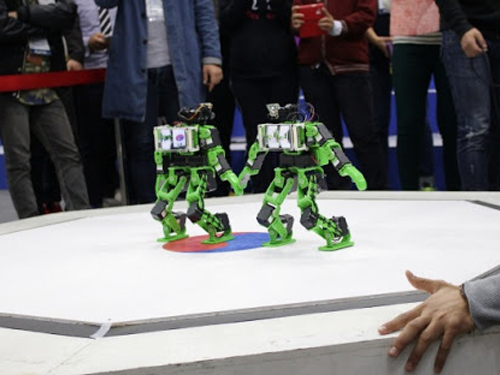 KAIST Holds the 2014 System on Chip (SoC) Robot War in August and October
Domestic and international competitions for robots with artificial intelligence are organized by Professor Hoi-Jun Yoo of Electrical Engineering.
KAIST will host two robot competitions this year: The Robot Integration Festival will be held in August at the Convention Center in Daejeon and the International Robot Contest in October at the Kintex in Ilsan. Participating robots are developed based on the System on Chip (SoC).
SoC robots refer to an autonomous robot that has a processor, a memory, peripheral devices, logic, and other system components combined on a single chip, which enables the robots to handle tasks and make decisions without human intervention.
The competitions include three entries: Taekwon Robot, HURO-competition, and SoC Drone which was added for the first time this year.
The Taekwon Robot involves a one-on-one sparring match, using a Korean traditional martial art, between two robots. Competitors score points based on front and side kicks, as well as punching. The HURO-competition pits robots in a competition to perform assignments such as hurdling, barricade clearing, crossing bridges, and overcoming other obstacles. The SoC Drone evaluates robots' capability to track miniature cars and navigate between buildings while in flight. The drone should have two cameras and a SoC brainboard equipped to offer autonomous, remote-controlled flight.
The director of the competitions, Professor Hoi-Jun Yoo of Electrical Engineering at KAIST, commented that with the integration of Korea’s world-class semiconductor technology, the competitions would lead to improvements in robotics engineering and unmanned aerial vehicle technology.
The competitions are open to anyone interested in SoC robots and unmanned aerial vehicles. For more information about the competitions, please visit http://www.socrobotwar.org . The application deadline is April 15, 2014.
2014.03.11 View 11093
KAIST Holds the 2014 System on Chip (SoC) Robot War in August and October
Domestic and international competitions for robots with artificial intelligence are organized by Professor Hoi-Jun Yoo of Electrical Engineering.
KAIST will host two robot competitions this year: The Robot Integration Festival will be held in August at the Convention Center in Daejeon and the International Robot Contest in October at the Kintex in Ilsan. Participating robots are developed based on the System on Chip (SoC).
SoC robots refer to an autonomous robot that has a processor, a memory, peripheral devices, logic, and other system components combined on a single chip, which enables the robots to handle tasks and make decisions without human intervention.
The competitions include three entries: Taekwon Robot, HURO-competition, and SoC Drone which was added for the first time this year.
The Taekwon Robot involves a one-on-one sparring match, using a Korean traditional martial art, between two robots. Competitors score points based on front and side kicks, as well as punching. The HURO-competition pits robots in a competition to perform assignments such as hurdling, barricade clearing, crossing bridges, and overcoming other obstacles. The SoC Drone evaluates robots' capability to track miniature cars and navigate between buildings while in flight. The drone should have two cameras and a SoC brainboard equipped to offer autonomous, remote-controlled flight.
The director of the competitions, Professor Hoi-Jun Yoo of Electrical Engineering at KAIST, commented that with the integration of Korea’s world-class semiconductor technology, the competitions would lead to improvements in robotics engineering and unmanned aerial vehicle technology.
The competitions are open to anyone interested in SoC robots and unmanned aerial vehicles. For more information about the competitions, please visit http://www.socrobotwar.org . The application deadline is April 15, 2014.
2014.03.11 View 11093 -
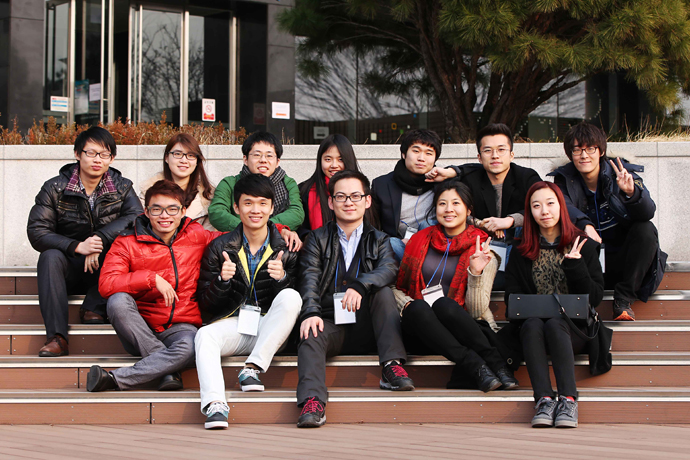 Festival Featuring Asia's Best Science Students to be Held
The first Electronic Olympics, which will host students from five top Asian research-centered universities, will be held in August at KAIST. Students will take part in competitive events and explore cultural diversity. Student representatives of HKUST, NTU, TITECH, Tsinghua University, and KAIST gathered on February 20 to begin planning the tentatively named “ASPIRE E-Olympics.”
The key words of this Olympics are "Harmony" and "Competition." The events will be composed of an AI programming contest, SEM (Scanning Electron Microscope) picture contest, and the other technology-based contests. Cultural events, where each university’s students can interact, will also be prepared.
ASPIRE (Asian Science and Technology Pioneering Institutes of Research and Education) events have been held from 2009. Previously, the ASPIRE forum has been an exchange event for groups of vice presidents and graduate school students from the five schools to exchange achievements in education and research. This year, it has been extended to undergraduates.
Yoseop Kim, KAIST’s student body vice president, said that he wants to make a MOU with some of Asia’s best research-centered universities and develop it into something similar to the Davos Forum. His intention is to support the E-Olympics in the hope that ASPIRE will become a top university consortium.
From left, HKUST, KAIST, NTU, TITECH, Tsinghua University Logos
Student representative group photo of Top Asian Research-Centered Universities
Electronic Olympics for students from five top Asian science and engineering universities to be held in August
2014.02.27 View 8980
Festival Featuring Asia's Best Science Students to be Held
The first Electronic Olympics, which will host students from five top Asian research-centered universities, will be held in August at KAIST. Students will take part in competitive events and explore cultural diversity. Student representatives of HKUST, NTU, TITECH, Tsinghua University, and KAIST gathered on February 20 to begin planning the tentatively named “ASPIRE E-Olympics.”
The key words of this Olympics are "Harmony" and "Competition." The events will be composed of an AI programming contest, SEM (Scanning Electron Microscope) picture contest, and the other technology-based contests. Cultural events, where each university’s students can interact, will also be prepared.
ASPIRE (Asian Science and Technology Pioneering Institutes of Research and Education) events have been held from 2009. Previously, the ASPIRE forum has been an exchange event for groups of vice presidents and graduate school students from the five schools to exchange achievements in education and research. This year, it has been extended to undergraduates.
Yoseop Kim, KAIST’s student body vice president, said that he wants to make a MOU with some of Asia’s best research-centered universities and develop it into something similar to the Davos Forum. His intention is to support the E-Olympics in the hope that ASPIRE will become a top university consortium.
From left, HKUST, KAIST, NTU, TITECH, Tsinghua University Logos
Student representative group photo of Top Asian Research-Centered Universities
Electronic Olympics for students from five top Asian science and engineering universities to be held in August
2014.02.27 View 8980 -
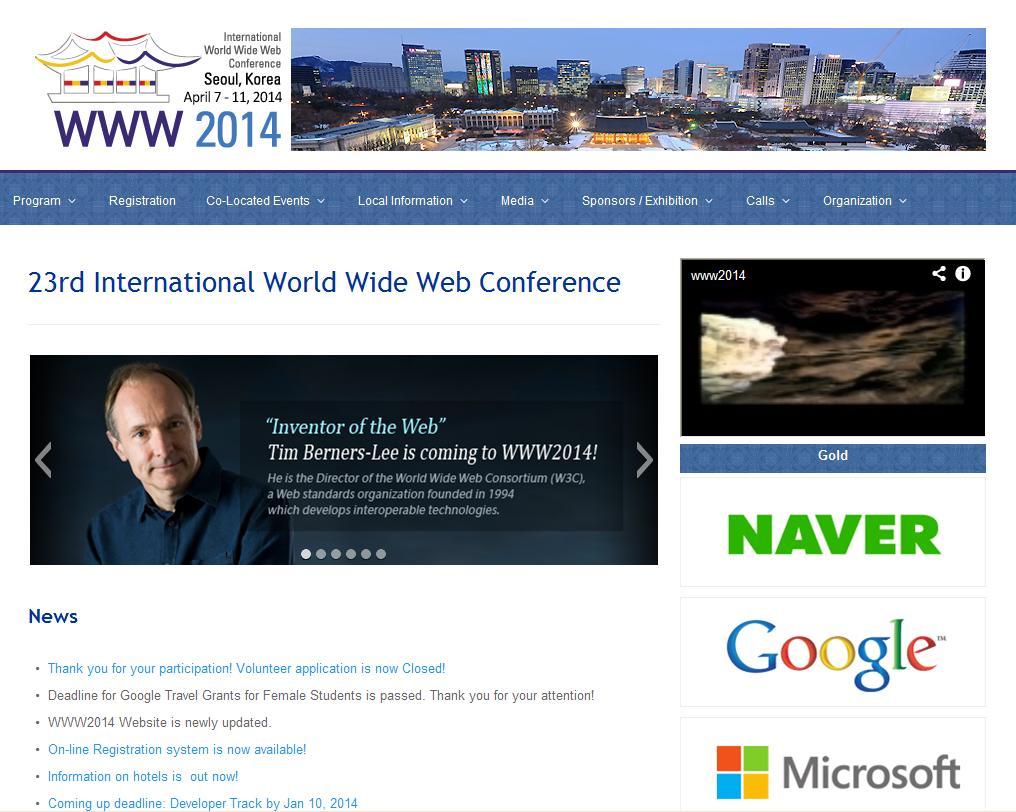 World's Largest Web Conference To Be Held in Korea
The 2014 International World Wide Web Conference (WWW 2014), the world’s most prestigious academic conference in the field of web, will be held for the first time in Korea. The conference is to be last for five days at Seoul COEX, from 7th to 11th April. International World Wide Web Conference covers a wide range of web-related areas, including technologies, research papers, services and more. Since the first conference in 1994 in Switzerland, it has been held in various parts of North America, Europe, South America and Asia, attracting more than 1000 experts in the field. The 23rd International World Wide Web Conference is managed by the International World Wide Web Conferences Steering Committee (IW3C2) and co-hosted by KAIST and National Agency for Technology and Standards, as well as sponsored by Korea Information Science Society and the World Wide Web Consortium (W3C). Keynote speakers for this year’s conference include inventor of the World Wide Web, Sir Tim Berners-Lee, senior vice president of Microsoft, Dr. Qi Lu, and Carnegie Mellon University’s Prof. Christos Faloutsos, as well as Samsung Electronic’s vice president Jong-Deok Choi. In addition to WWW 2014, BigData Innovators Gathering (BIG 2014) and Web for Access (W4A 2014) is also to be held in joint. KAIST Computer Sciences Department’s Prof. Jinwan Jeong, in charge of directing this year’s conference, said “From one-sided 1st generation web to two-way 2nd generation web, such as blogs, and then recently to the 3rd generation web, which include social networks and semantic webs, the web technologies has grown vastly over the past 25 years. WWW 2014 will be the opportunity for Korea to discuss with the world about the informatization and future of the web.” Pre-registration for WWW 2014 can be applied at the official webpage for WWW 2014 (http://www2014.kr) before 17th February.
2014.02.14 View 11087
World's Largest Web Conference To Be Held in Korea
The 2014 International World Wide Web Conference (WWW 2014), the world’s most prestigious academic conference in the field of web, will be held for the first time in Korea. The conference is to be last for five days at Seoul COEX, from 7th to 11th April. International World Wide Web Conference covers a wide range of web-related areas, including technologies, research papers, services and more. Since the first conference in 1994 in Switzerland, it has been held in various parts of North America, Europe, South America and Asia, attracting more than 1000 experts in the field. The 23rd International World Wide Web Conference is managed by the International World Wide Web Conferences Steering Committee (IW3C2) and co-hosted by KAIST and National Agency for Technology and Standards, as well as sponsored by Korea Information Science Society and the World Wide Web Consortium (W3C). Keynote speakers for this year’s conference include inventor of the World Wide Web, Sir Tim Berners-Lee, senior vice president of Microsoft, Dr. Qi Lu, and Carnegie Mellon University’s Prof. Christos Faloutsos, as well as Samsung Electronic’s vice president Jong-Deok Choi. In addition to WWW 2014, BigData Innovators Gathering (BIG 2014) and Web for Access (W4A 2014) is also to be held in joint. KAIST Computer Sciences Department’s Prof. Jinwan Jeong, in charge of directing this year’s conference, said “From one-sided 1st generation web to two-way 2nd generation web, such as blogs, and then recently to the 3rd generation web, which include social networks and semantic webs, the web technologies has grown vastly over the past 25 years. WWW 2014 will be the opportunity for Korea to discuss with the world about the informatization and future of the web.” Pre-registration for WWW 2014 can be applied at the official webpage for WWW 2014 (http://www2014.kr) before 17th February.
2014.02.14 View 11087 -
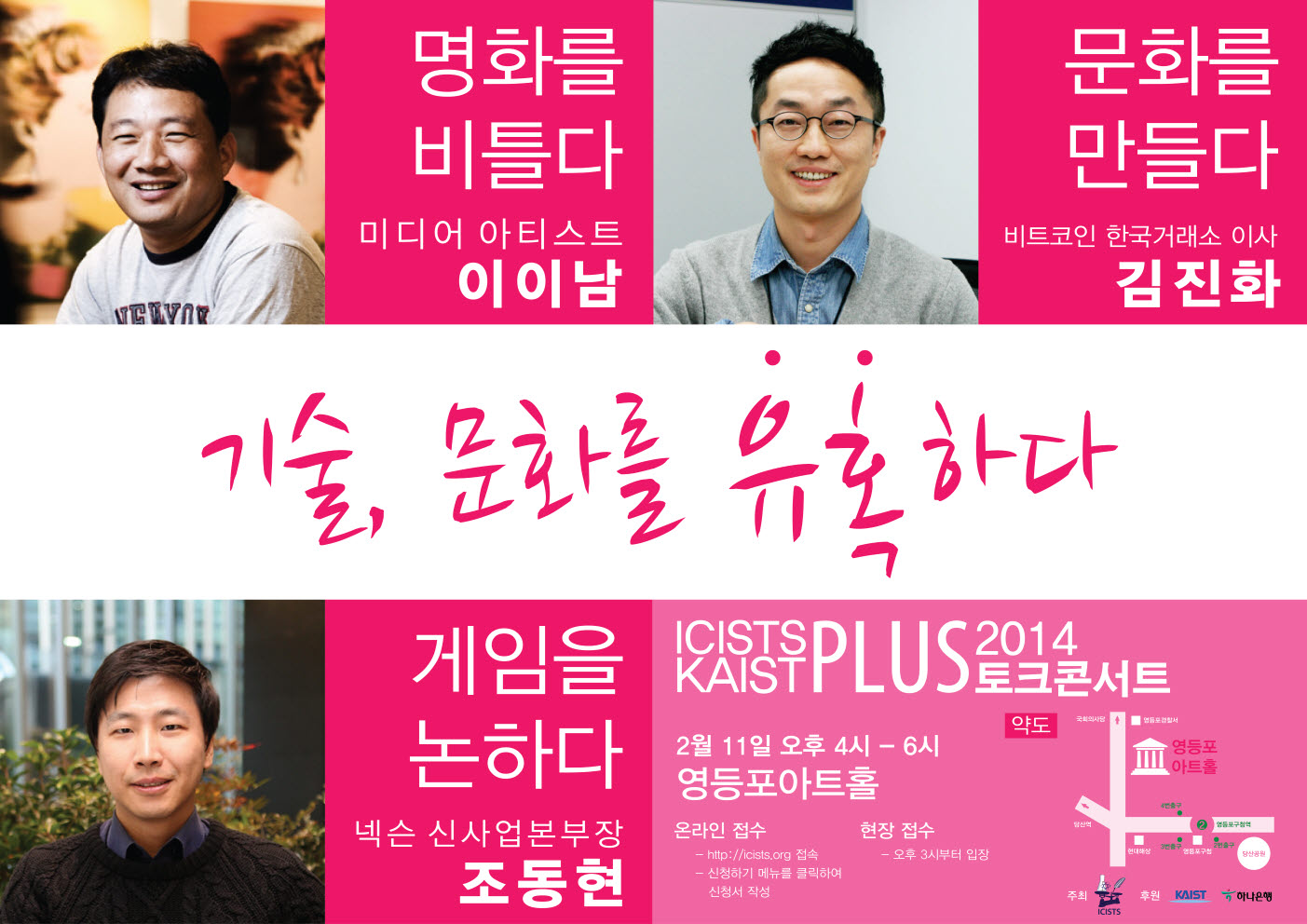 ICISTS-KAIST Talk Concert 2014
The International Conference for the Integration of Science, Technology and Society at KAIST (ICISTS-KAIST) will hold a talk entitled “Scientific Technology and Culture” at Youngdungpo Art Hall in Seoul on Tuesday, February 11, 2014.The three main presenters will be: Jin-Hwa Kim, Director of Korbit, Dong-Hyeon Jo, Chief of New Business at Nexon, and media artist Yi-Nam Lee. They will address the meeting of culture and scientific technology in the fields of art, games, and other genres.Jin-Hwa Kim is the director of Korbit, the first Korean bitcoin exchange, and wrote The Next Money: Bitcoin, the world’s first bitcoin textbook. He will elaborate on how science and technology are constantly changing and have affected popular culture, and how public demand gave birth to bitcoin.Dong-Hyeon Jo from Nexon will explain how the appearance of new media and platforms such as smartphones has changed our lives.Media artist Yi-Nam Lee has been described as “the second Nam-June Paik,” an internationally-acclaimed video artist, for his integration of oriental and western masterpieces with modern media. During the event, samples of his artwork will be displayed.ICISTS-KAIST is a student organization which has held a conference every year since 2005 with hundreds of students attending from many parts of the world, Asia in particular.
2014.02.07 View 11231
ICISTS-KAIST Talk Concert 2014
The International Conference for the Integration of Science, Technology and Society at KAIST (ICISTS-KAIST) will hold a talk entitled “Scientific Technology and Culture” at Youngdungpo Art Hall in Seoul on Tuesday, February 11, 2014.The three main presenters will be: Jin-Hwa Kim, Director of Korbit, Dong-Hyeon Jo, Chief of New Business at Nexon, and media artist Yi-Nam Lee. They will address the meeting of culture and scientific technology in the fields of art, games, and other genres.Jin-Hwa Kim is the director of Korbit, the first Korean bitcoin exchange, and wrote The Next Money: Bitcoin, the world’s first bitcoin textbook. He will elaborate on how science and technology are constantly changing and have affected popular culture, and how public demand gave birth to bitcoin.Dong-Hyeon Jo from Nexon will explain how the appearance of new media and platforms such as smartphones has changed our lives.Media artist Yi-Nam Lee has been described as “the second Nam-June Paik,” an internationally-acclaimed video artist, for his integration of oriental and western masterpieces with modern media. During the event, samples of his artwork will be displayed.ICISTS-KAIST is a student organization which has held a conference every year since 2005 with hundreds of students attending from many parts of the world, Asia in particular.
2014.02.07 View 11231 -
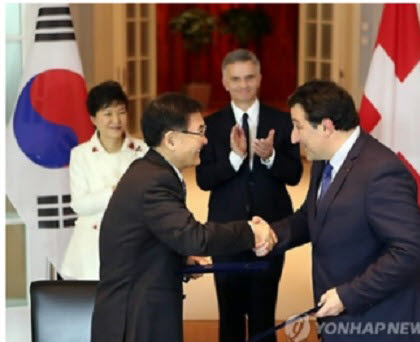 2014 Davos Forum: KAIST-EPFL Connection
The Korean-American Science and Technology News (KASTN), a biweekly global electronic newsletter carrying news and analyses in science and technology, as well as social, economic, and cultural issues related to the general interest of the Korean-American professional community, published an article on the partnership agreement made by KAIST and the Ecole Polytechnique Federale Lausanne (EPFL) during the 2014 World Economic Forum held at Davos, Switzerland, from January 22nd to 25th.
For the article, please click the link below: KASTN Issue 14-05, February 26, 2014
http://www.phy.duke.edu/~myhan/b_14-05.pdf
2014.02.04 View 9258
2014 Davos Forum: KAIST-EPFL Connection
The Korean-American Science and Technology News (KASTN), a biweekly global electronic newsletter carrying news and analyses in science and technology, as well as social, economic, and cultural issues related to the general interest of the Korean-American professional community, published an article on the partnership agreement made by KAIST and the Ecole Polytechnique Federale Lausanne (EPFL) during the 2014 World Economic Forum held at Davos, Switzerland, from January 22nd to 25th.
For the article, please click the link below: KASTN Issue 14-05, February 26, 2014
http://www.phy.duke.edu/~myhan/b_14-05.pdf
2014.02.04 View 9258 -
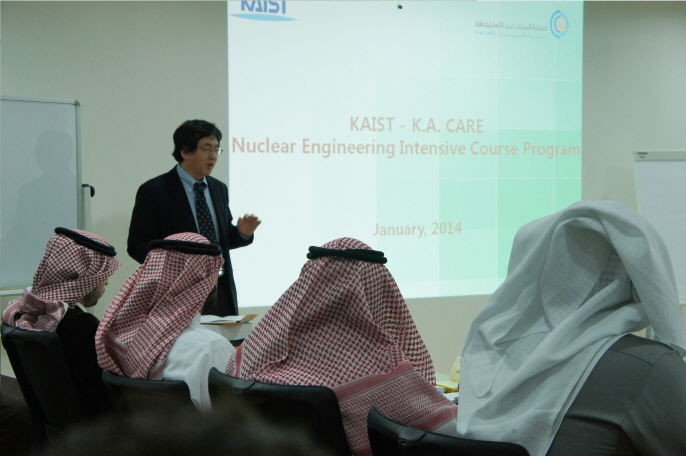 KAIST-Saudi Nuclear Workforce Training
Nuclear Engineering Intensive Course Program Held in Saudi Arabia from January 5th to 23rd
KUSTAR (The Khalifa University of Science and Technology Studies)-KAIST Institute of Education began its Nuclear Engineering Intensive Course Program on 5th January with researchers from K.A.CARE (King Abdullah City for Atomic and Renewable Energy) of Riyadh, Saudi Arabia.
This program, which was lasted until 23rd January, provided education to students on the basic technologies in the field of nuclear power.
The course involves a wide range of lectures, such as basic nuclear physics, applications using radiation, nuclear reactor design and safety, as well as nuclear power engineering.
In order to utilize the nuclear power and renewable energy, K.A.CARE was established in April 2010. The institution is also involved in the construction of nuclear infrastructure, including the site investigations, the establishment of regulatory bodies and state-owned nuclear companies, along with the newly launched workforce-training program.
The Director of the KUSTAR-KAIST Education Research Institute, Professor Soong-Heung Jang said, “This program is the beginning of long-term cooperation with Saudi Arabia. Our experience can be the basis for the construction of an extensive training program that involves many areas of nuclear engineering field.”
KAIST has been working in close cooperation with various institutions around the world, which also includes the establishment of KUSTAR-KAIST Institute of Education and Research in July 2010. KAIST is also actively cooperating with UAE Khalifa University in Middle East, sharing faculty, holding joint research programs and exchanging students.
2014.02.03 View 11469
KAIST-Saudi Nuclear Workforce Training
Nuclear Engineering Intensive Course Program Held in Saudi Arabia from January 5th to 23rd
KUSTAR (The Khalifa University of Science and Technology Studies)-KAIST Institute of Education began its Nuclear Engineering Intensive Course Program on 5th January with researchers from K.A.CARE (King Abdullah City for Atomic and Renewable Energy) of Riyadh, Saudi Arabia.
This program, which was lasted until 23rd January, provided education to students on the basic technologies in the field of nuclear power.
The course involves a wide range of lectures, such as basic nuclear physics, applications using radiation, nuclear reactor design and safety, as well as nuclear power engineering.
In order to utilize the nuclear power and renewable energy, K.A.CARE was established in April 2010. The institution is also involved in the construction of nuclear infrastructure, including the site investigations, the establishment of regulatory bodies and state-owned nuclear companies, along with the newly launched workforce-training program.
The Director of the KUSTAR-KAIST Education Research Institute, Professor Soong-Heung Jang said, “This program is the beginning of long-term cooperation with Saudi Arabia. Our experience can be the basis for the construction of an extensive training program that involves many areas of nuclear engineering field.”
KAIST has been working in close cooperation with various institutions around the world, which also includes the establishment of KUSTAR-KAIST Institute of Education and Research in July 2010. KAIST is also actively cooperating with UAE Khalifa University in Middle East, sharing faculty, holding joint research programs and exchanging students.
2014.02.03 View 11469 -
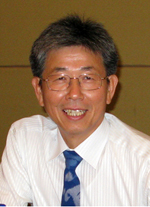 Professor Suk-Joo Na Invited to Finland as Distinguished Professor
Professor Suk-Joo Na, from the Department of Mechanical Engineering at KAIST, has been invited as a distinguished professor for an international research project in Finland.
As a leading scientist in the field of arc welding and numerical analysis of the laser welding process, Na will assemble a research group for the interpretation of the welding processes for three years at the VVT Technical Research Centre of Finland beginning in January of 2014.
The project was established to improve the research level and national competitiveness of Finland by inviting leading international scientists to the National Technology Agency of Finland and Academy of Finland since 2006 and over one hundred projects have been carried out thus far. A total of 17 billion won will be invested for the eleven new projects selected this year. Professor Na said, “The fusion welding field contains important technology for improving the competitiveness of mechanical products of Finland. Improvements in productivity, the life cycles of products, and energy saving through interpretation technology for the numerical analysis of the welding process will make a huge impact on the national economy of Finland.”
2013.12.24 View 10114
Professor Suk-Joo Na Invited to Finland as Distinguished Professor
Professor Suk-Joo Na, from the Department of Mechanical Engineering at KAIST, has been invited as a distinguished professor for an international research project in Finland.
As a leading scientist in the field of arc welding and numerical analysis of the laser welding process, Na will assemble a research group for the interpretation of the welding processes for three years at the VVT Technical Research Centre of Finland beginning in January of 2014.
The project was established to improve the research level and national competitiveness of Finland by inviting leading international scientists to the National Technology Agency of Finland and Academy of Finland since 2006 and over one hundred projects have been carried out thus far. A total of 17 billion won will be invested for the eleven new projects selected this year. Professor Na said, “The fusion welding field contains important technology for improving the competitiveness of mechanical products of Finland. Improvements in productivity, the life cycles of products, and energy saving through interpretation technology for the numerical analysis of the welding process will make a huge impact on the national economy of Finland.”
2013.12.24 View 10114 -
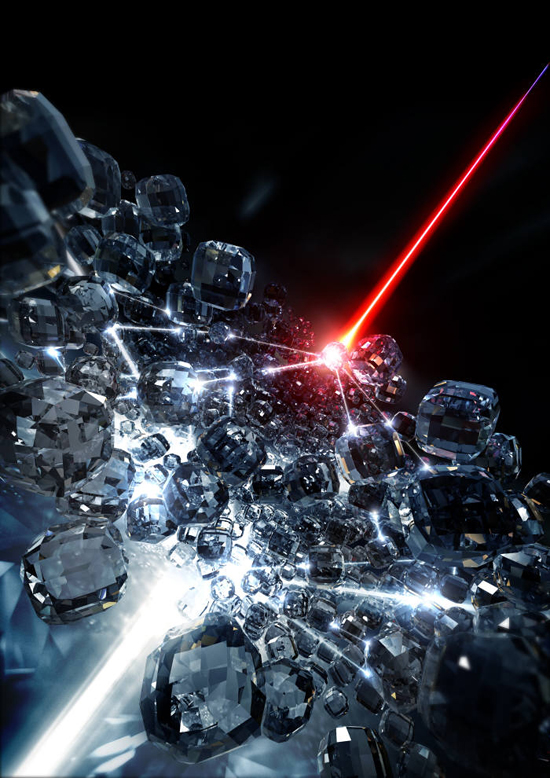 Nanoparticle based Super Lens selected as 2013 Science and Technology News
Professor Yong-keun Park
"Nanoparticle-based Super Lens", an article by KAIST Physics Department’s Professor Yong-keun Park and Professor Yong-hoon Cho’s joint research team, has been selected as one of the ten representative 2013 Science and Technology News, by the Korea Federation of Science and Technology Societies.
This new concept super lens uses the scattering of light, which can yield over three times more superior resolution of previous optical lenses.
Unlike the conventional optical lens that utilizes refraction of the light, the super lens can give the image of viruses and structure within the cell at 100㎚. This lens is also applicable to state-of-the-art optical and semiconductor processes.
In addition, this year's research achievements also include the successful launch of Naro, a new technology to remove the brain cell membrane which gives a more transparent view of the brain, a new drug to inhibit cancer metastasis, as well as the development of ultra-wide-angle insect eye camera technology.
Articles for 2013 Science and Technology News are chosen in three trial reviews by committee and online voting by 5,437 people over the course of [two weeks]14 days, from November 21st to December 4th.
2013.12.14 View 11009
Nanoparticle based Super Lens selected as 2013 Science and Technology News
Professor Yong-keun Park
"Nanoparticle-based Super Lens", an article by KAIST Physics Department’s Professor Yong-keun Park and Professor Yong-hoon Cho’s joint research team, has been selected as one of the ten representative 2013 Science and Technology News, by the Korea Federation of Science and Technology Societies.
This new concept super lens uses the scattering of light, which can yield over three times more superior resolution of previous optical lenses.
Unlike the conventional optical lens that utilizes refraction of the light, the super lens can give the image of viruses and structure within the cell at 100㎚. This lens is also applicable to state-of-the-art optical and semiconductor processes.
In addition, this year's research achievements also include the successful launch of Naro, a new technology to remove the brain cell membrane which gives a more transparent view of the brain, a new drug to inhibit cancer metastasis, as well as the development of ultra-wide-angle insect eye camera technology.
Articles for 2013 Science and Technology News are chosen in three trial reviews by committee and online voting by 5,437 people over the course of [two weeks]14 days, from November 21st to December 4th.
2013.12.14 View 11009